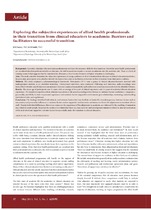| dc.contributor.author | Frantz, Jose M. | |
| dc.contributor.author | Smith, Mario | |
| dc.date.accessioned | 2014-08-21T13:23:45Z | |
| dc.date.available | 2014-08-21T13:23:45Z | |
| dc.date.issued | 2013 | |
| dc.identifier.citation | Frantz, J.M. & Smith, M.R. (2013). Exploring the subjective experiences of allied health professionals in their transition from clinical educators to academia: barriers and facilitators to successful transition. African Journal of Health Professions Education(AJHPE), 5(1):37-41 | en_US |
| dc.identifier.issn | 2078-5127 | |
| dc.identifier.uri | http://hdl.handle.net/10566/1196 | |
| dc.description.abstract | Background: Currently, clinicians who move into academia may not have the necessary skills for this transition. Given that most health professionals are socialised into their professional roles as clinicians, the shift to academia requires a second socialisation into the academic role. There is a body of existing research that suggests that the transition for clinicians as they become lecturers in higher education is challenging. Aim; This study aimed to determine the subjective experiences of young academics in their transition from clinicians to clinical educators/academics. In particular, participants were asked to identify the factors that acted as facilitators or barriers to their transition from clinician to academic. Methods: The study employed a phenomenological framework. Participants (N=7) were a group of clinical educators/lecturers involved with
undergraduate students at an identified institution. Unstructured interviews were conducted. Following each interview, audio-recordings were transcribed verbatim and all data were anonymised. Data were analysed manually by each author and consensus was reached on the identified themes. Results: The mean age of participants was 31 years, with an average of 8.4 years of clinical experience and 3.4 years of academic/clinical education experience. The transition experience from clinician to academic is discussed according to two themes, i.e. intrinsic factors (confidence, competence, personality, and ability to draw on personal experience) and extrinsic factors (supportive environment, peer relationships, mentoring, understanding
institutional rules and regulations). Conclusion: The findings identified both intrinsic and extrinsic factors that may facilitate or hinder the transition process. Intrinsic factors such as uncertainty and personality influences or extrinsic factors such as supportive environments can interact to thwart the adjustment or transition of new staff. Despite individual differences, there is an essence to the experience of the adjustment to academic, as evidenced by the reaching of saturation in a relatively small sample. Based on the results, it is evident that there is a clear need for staff development initiatives related to internal motivation of the individual and supportive extrinsic factors to successfully make the transition to clinical education. | en_US |
| dc.language.iso | en | en_US |
| dc.publisher | Health and Medical Publishing Group | en_US |
| dc.rights | © 2013 Frantz & Smith; licensee Health and Medical Publishing Group. This is an Open Access article distributed under the terms of the Creative Commons Attribution License (http://creativecommons.org/licenses/by/3.0), which permits unrestricted use, distribution, and reproduction in any medium, provided the original work is properly cited. | |
| dc.title | Exploring the subjective experiences of allied health professionals in their transition from clinical educators to academia: barriers and facilitators to successful transition | en_US |
| dc.type | Article | en_US |
| dc.privacy.showsubmitter | false | |
| dc.status.ispeerreviewed | true | |

